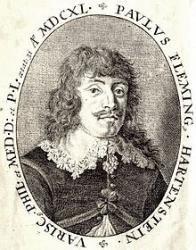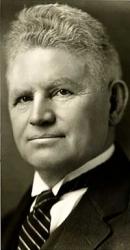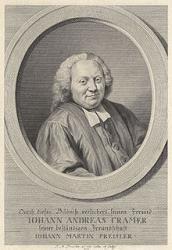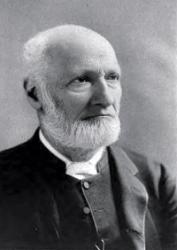Planning worship?
Check out our sister site, ZeteoSearch.org,
for 20+ additional resources related to your search.
- |
User Links
Person Results
Bartholomäus Gesius
1555 - 1613 Adapter of "INNSPRUCK" in American Lutheran Hymnal Bartholomaeus Gesius; b. 1555, Muencheberg, near Frankfort; d. 1613 or 14, Wittenberg
Evangelical Lutheran Hymnal, 1908
Bartholomäus Gesius
Heinrich Isaac
1450 - 1517 Person Name: Heinrich Isaac, ?-c. 1510 Composer of "INNSBRUCK" in The Book of Praise Heinrich Isaac; b. about 1450, Germany; organist in Florence, Italy; supposed to have died there abour 1517
Evangelical Lutheran Hymnal, 1908
Heinrich Isaac
Paul Flemming

1609 - 1640 Author of "In allen meinen Thaten" in Die Glaubensharfe (With Melodies) Flemming, Paul , son of Abraham Flemming or Fleming, then schoolmaster at Hartenstein, near Zwickau, Saxony (afterwards pastor of Wechselburg, near Mittweida), was born at Hartenstein, Oct. 5 or 12, 1609. He entered the St. Thomas School, Leipzig, in 1623, and matriculated at the University of Leipzig at Michaelmas, 1626, At the University he devoted himself to the study of medicine and of poetry, being laureated as a poet in 1631, and graduating M.A. in 1632. In order to find refuge from the troubles of the Thirty Years' War he went to Holstein in 1633. In the same year he joined an embassy which Duke Friedrich of Schleswig-Holstein was about to send to his brother-in-law, the Russian Czar, as gentleman in waiting and "taster." In this expedition he was engaged from Oct. 22, 1633, to April 6, 1635. He then took part in the embassy sent by the Duke to the Shah of Persia, with the object of opening up the way for trade and Christianity into Central Asia. They set sail from Travemünde, near Lübeck, Oct. 27, 1635, and returned to Gottorf, Aug. 1, 1639. The expedition proved fruitless, and the many dangers and great hardships encountered broke Flemming's health. To qualify himself for medical practice in Hamburg he went to the University of Leyden, where he graduated M.D. in 1640; but shortly after his return to Hamburg he died there, March 25 (April 2), 1640 (Koch, iii. 73-82; Allgemeine Deutsche Biographie, vii. 115-117).
Flemming was of an energetic temperament, with an ardent patriotism, and a deep love for the Evangelical Cause. He was a gifted poet, of true and deep feeling, who could write charming descriptions of the beauties of nature, and sweet and tender love songs. His secular poems, however, as a whole have the faults of the Silesian school of Martin Opitz; and it is by his hymns, and especially by his classical "In allen meinen Thaten," that his name lives.
His poems were first collected by the father of his betrothed as D. P. Fleming's Teutsche Poemata, and appeared in 1642 in two editions nearly alike, one at Naumburg and Jena, the other at Lübeck. The most complete edition is that by J. M. Lappenberg, 2 vols., Stuttgart, 1865-66. Of his 41 religious poems (12 hymns, 9 odes, 20 sonnets) three have passed into English.
i. In alien meinen Thaten . Trust in God. This beautiful hymn was written in November, 1633, just before he started with the embassy to Moscow (see above); and may often have cheered his own sinking spirit then and in the more trying adventures of the second embassy. It first appeared in his Teutsche Poemata , 1642 (Lübeck edition, p. 287; Lappenberg's edition, i. p. 236), as No. 4 in Book i. of the Odes, in 15 stanza of 6 1. It was included in the Stralsund Gesang-Buch, 1665, Freylinghausen's Gesang-Buch , 1704, and almost all recent collections. Sometimes, as in the Unverfalschter Liedersegen, 1851, No. 646, it is given in full, but more frequently the special stanzas appropriate for travellers (vi.-ix., xiii., xiv.) are omitted. It is characterised in Koch, viii. 379, as a "pilgrim song suited for the Christian journey which we must all in faith make through joy and sorrow to our Eternal Home." Lauxmann adds that it has often been used appropriately at weddings, was the favourite hymn of Friedrich Wilhelm III. of Prussia, and was sung at the service in the Cathedral of Berlin, July 19, 1870, on the open¬ing of the North German Diet immediately before the Franco-Prussian War. Translated as:—
I leave to His good pleasure , a translation of st. i., ii., iv, by A. T. Russell, as No. 232 in his Psalms & Hymns , 1851.
Other translations are : (l) “In all my plans, Thou Highest," by Dr. H. Mills, 1856, p. 167. (2) “Where'er I go, whate'er my task," by Miss Winkworth, 1858, p. 108, repeated in L. Rehfuess's Church at Sea , 1868, p. 9. (3) "In every deed and word," in Madame de Pontes's Poets & Poetry of Germany, 1858, vol. i. p. 416.
His hymns not in English common use are:—
ii. Ist's mőglich, dass der Haas auch kann geliebet sein. The Love of God. In the Lübeck edition, 1642, p. 555 (Lappenberg's edition, i. p. 450), as No. 16 in Book i. of the Sonnets . Translated as, "Can it then be that hate should e'er be loved," by Miss Winkworth, 1869, p. 175.
iii. Lass dich nur Nights nicht tauren. Cross and Consolation. Probably written in Persia during the second embassy. In the Lübeck edition, 1642, p. 283 (Lappenberg's edition, i. p. 244), as No. 1 in Book i. of the Odes, in 3 st. of 6 l.
The translations are:
(1) "Only let nothing grieve thee," by Madame de Ponies, 1858, v. i. p. 415. (2) "Let nothing make thee sad or fretful," by Miss Winkworth, 1869, p. 175.
[Rev. James Mearns, M.A.]
- John Julian, Dictionary of Hymnology (1907)
Paul Flemming
Hugh T. Henry, 1862-1946
1862 - 1946 Translator (sts. 1, 3) of "O Bread of Life from Heaven" in Evangelical Lutheran Worship Born: November 27, 1862, Philadelphia, Pennsylvania.
Died: March 12, 1946, Jessup, Pennsylvania.
Henry attended LaSalle College, the University of Pennsylvania, and St. Charles Seminary, Overbrook, Pennsylvania. After ordination in 1889, he taught English and Latin at the seminary until 1894, music and literature until 1917, and directed the seminary choir. He went on to serve as Rector of the Philadelphia Catholic High School for Boys (1902-19), and professor of homiletics at the Catholic University of America, Washington, DC (1919-37). He is also remembered as a lecturer at the Catholic Summer School, Cliff Haven, New York; president of the American Catholic Historical Society of Philadelphia; editor of Church Music (1905-14); and author of Catholic Customs and Symbols.
--www.hymntime.com/tch
Hugh T. Henry, 1862-1946
Hans Adolf Brorson

1694 - 1764 Person Name: Hans Adolf Brorson, 1694-1764 Author of "Praise God, This Hour of Sorrow" in Ambassador Hymnal
Hans Adolf Brorson
F. Melius Christiansen

1871 - 1955 Person Name: F. Melius Christiansen, 1871-1955 Arranger of "INNSBRUCK" in Ambassador Hymnal F. Melius Christiansen (April 1, 1871-June 1, 1955) was a Norwegian-born violinist and choral conductor in the Lutheran choral tradition.
Fredrik Melius Christiansen, the son of a Norwegian factory worker, was born in Eidsvold, municipality in Akershus county, Norway and emigrated to the United States at the age of 17. He settled in Washburn, Wisconsin. He studied at Augsburg College. In 1897, he returned to Europe to study three years at the Royal Conservatory of Music in Leipzig, Germany.
In 1901, Christiansen was recruited by St. Olaf College president John N. Kildahl. The St. Olaf Choir was founded as an outgrowth of the St. John's Lutheran Church Choir in Northfield. For the next 30 years, Christiansen led the St. Olaf Choir, striving for perfect intonation, blend, diction and phrasing. He was a skilled conductor, directing bands and choirs alike. He assumed direction of the St. Olaf Band in 1903, and took the ensemble on tour to Norway in 1906 to play for King Haakon VII, making it the first college music ensemble to conduct a tour abroad. Though his first love was the violin, he received international fame as founding director of the St. Olaf Choir of St. Olaf College in Northfield, Minnesota, USA from 1912 to 1944. Christiansen was considered a pioneer in the art of a cappella (unaccompanied) choral music. Christiansen composed and arranged over 250 musical selections and his choral techniques were spread throughout the U.S. by St. Olaf graduates. The great Christiansen choral tradition is a recognized feature of American Lutheranism.
Four of Dr. Christiansen's children survived to adulthood two of them adding their own legacy to the Christiansen tradition of choral music in America.
--en.wikipedia.org/wiki/
F. Melius Christiansen
Christian H. Rinck
1770 - 1846 Person Name: Rinck Composer of "[In allen meinen Thaten laß ich den Höchsten raten]" in Deutsches Liederbuch Johann Christian Heinrich Rinck; b. 1770, Elgersburg, Thueringen; d. 1846, Darmstadt
Evangelical Lutheran Hymnal, 1908
Christian H. Rinck
Johann Andreas Cramer

1723 - 1788 Person Name: Cramer Author of "Wer zählt der Engel Heere" in Gesangbuch für deutsche Gemeinden Cramer, Johann Andreas, born Jan. 27, 1723, at Jönstadt or Johann-Georgen-Stadt, in the Saxon Harz, where his father was pastor. After studying at the University of Leipzig, where he graduated M.A. in 1745, he was in 1748 appointed preacher at Crellwitz, near Lützen, and in 1750 Court Preacher and member of the Consistory at Quedlinburg. Four years later he became German Court Preacher to King Frederick V. of Denmark, at Copenhagen. There he obtained great fame as a preacher and teacher; and was appointed in 1765 Professor of Theology in the University. But after the accession of Charles VII., in 1766, the free-thinking party in the State gradually gained the ascendancy, and procured his removal; whereupon he was appointed, in 1771, Superintendent in Lubeck. When the orthodox party regained power in 1774, he was recalled to Denmark, as Vice-Chancellor, and First Professor of Theology in the University of Kiel, and in 1784 Chancellor. He died at Kiel on the night of June 11-12, 1788 (Koch, vi. 334-344; Allgemeine Deutsche Biographie, iv. 550-551; Bode, pp. 54-55—the last dating his birth, Jan. 29).
Cramer was rather a writer of religious lyrics than of hymns, though at least 80 of his compositions passed Into the hymn-books of his times. Those that have been translated into English are all included either in the Allgemeines Gesang-
Buch, Altona, 1780, which he edited for use in Schleswig-Holstein, or in his Sämmtliche Gedichtet Leipzig, 1782-3.
They are:—
i. Die ihr des Lebens edle Zeit. The duty of the Scholar. 1780, as above, No. 820, in 12 stanzas, repeated 1782, vol. ii. p. 319. Translated as, "O ye, who from your earliest youth," by Miss Winkworth, 1869, p. 321.
ii. Erheb, erheb, 0 meine Seele. Ps. civ. In his Poetische Uebersetzung der Psalmen, Leipzig, 1763, pt. iii., p. 65, in 16 stanzas. Included, 1780, as above, No. 124. The form translated is that in the Württemberg Gesang-Buch 1791, No. 36 (1842, No. 59), beginning with stanza ii. “Herr, dir ist niemand zu vergleichen." Tr. as, "Lord, none to Thee may be compared," by Miss Burlingham, in the British Herald, Jan. 1866, p. 200, repeated in Reid's Praise Book, 1872, No. 373.
iii. Erwachet, Harf’ und Psalter. Morning. Founded on Ps. cviii. First published in Zollikofer's Gesang-Buch, Leipzig, 1766, No. 71, in 6 stanzas. Repeated, 1780, as above, No. 2, and as No. 41 of the hymns appended to his Evangelische Nachahmungen der Psalmen Davids, Kopenhagen, 1769, p. 272. Translated by H. J. Buckoll, 1842, p. 59, as:—"Wake, harp and psaltery sounding."
iv. Schuf mich Gott für Augenblicke. Immortality of the Soul. 1780, as above, No. 136, in 12 St., repeated, 1782, vol. i. p. 181. Tr. (beginning with st. vi., "Geist! das ist mein hoher Name"), by Dr. H. Mills, 1845, as:—"Man were better nam'd a spirit."
v. Sterbend für das Heilder Sunder. Ascension. In the Bayreuth Gesang-Buch, 1779, No. 173, in 4 stanzas. Included, 1780, as above, No. 319, and 1782, vol. ii. p. 33. Translated by Dr. H. Mills, 1845, as:—"Dying a guilty world to save."
vi. Unerforschlich sei mir immer. God's Wisdom. First published in his Andachten in Betrachtungen, Gebeten und Liedern, &c, vol. ii., pt. ii., Schleswig and Leipzig, 1768, and thence in Rambach, v. 54. Included in 1769 (see No. iii.), p. 250, and 1780 as above, No. 78. Translated (1) in Sacred Poems by S. R. Maxwell, 1857, p. 126, as:— “Though inscrutable may ever"; (2) by Dr. G. Walker, 1860, p. 94, as:—" Inscrutable to me although."
[Rev. James Mearns, M.A.]
--John Julian, Dictionary of Hymnology (1907)
Johann Andreas Cramer
Joseph Anstice
1808 - 1836 Person Name: J. Anstice Author of "O Lord, how happy should we be" in The Academic Hymnal Anstice, Joseph , M.A., son of William Anstice of Madeley, Shropshire, born 1808, and educated at Enmore, near Bridgwater, Westminster, and Ch. Church, Oxford, where he gained two English prizes and graduated as a double-first. Subsequently, at the ago of 22, he became Professor of Classical Literature at King's College, London; died at Torquay, Feb. 29, 1836, aged 28. His works include Richard Coeur de Lion, a prize poem, 1828; The Influence of the Roman Conquest upon Literature and the Arts in Rome (Oxford prize Essay); Selections from the Choice Poetry of the Greek Dramatic Writers, translated into English Verse, 1832, &c. His hymns were printed a few months after his death, as:— Hymns by the late Joseph Anstice, M.A., formerly Student of Christ Church, Oxford, and Professor of Classical Literature, King’s College, London, Bridgwater, 1836, and thus introduced:—
"As none of the following Hymns had the advantage of being corrected and prepared for the press by their lamented Author, his family have not considered themselves at liberty to bring them before the public; but, having reason to believe that a large circle of surviving friends will be gratified by possessing a memorial of the manner in which some of his leisure hours were employed, and of the subjects which chiefly occupied his thoughts, during the last few months of his life, they have consented to their being printed for private distribution.—-Bridgwater, June, 1836."
This work contains 52 hymns on various subjects, together with a poem "To my Hymn Book." The circumstances under which they were written are thus detailed by Mrs. Anstice in a communication to the Rev. Josiah Miller, author of Singers and Songs of the Church:—
"The hymns were all dictated to his wife during the last few weeks of his life, and were composed just at the period of the day (the afternoon) when he felt the oppression of his illness—all his brighter morning hours being given to pupils up to the very day of his death."-—S. & S., p. 495.
A few of the hymns are of a joyful character, but the circumstances under which they were written account for the prevailing tone of sadness by which they are chiefly characterized. About one half of these hymns were included by Mrs. Yonge in her Child's Christian Year, 1841. Being thus brought before the public, many soon came into common use. Those in most extensive use are: "Father, by Thy love and power;" "In all things like “Thy brethren, Thou;" "Lord of the harvest, once again;" and, "O Lord, how happy should we be."
-- John Julian, Dictionary of Hymnology (1907)
Joseph Anstice
Philip Schaff

1819 - 1893 Person Name: Philip Schaff, 1819-1893 Translator of "O Bread of Life from Heaven" in Ambassador Hymnal Schaff, Philip, D.D., LL.D., was born at Chur, Switzerland, Jan. 1, 1819. He studied at the Universities of Tübingen, Halle, and Berlin. In 1843 he was appointed a Professor in the German Reformed Theological Seminary at Mercersburg, Pennsylvania, U.S.A., and in 1870 Professor of Sacred Literature in the Union Seminary, New York. As translator, author, and editor, Dr. Schaff holds high rank, both in Great Britain and America. The various Histories and Encyclopedias which he has edited are standard works. His knowledge of hymnology is extensive, and embraces hymns in many languages and of all ages, his speciality being German hymnody. The hymnological works which he has edited alone, or jointly with others, are:—
(1) Deutsches Gesangbuch, 1860; (2) Christ in Song, a most valuable collection of original English and American hymns, and translated hymns, N.Y. 1869, London, 1870; (3) Hymns and Songs of Praise for Public and Social Worship, 1874, in which he was assisted by Boswell D. Hitchcock, and Zachary Eddy; (4) Library of Religious Poetry, 1881, of which A. Gilman was joint editor.
Dr. Schaff has not composed any original hymns. His translations from the Latin are meritorious. He died Oct. 20, 1893.
--John Julian, Dictionary of Hymnology (1907)
Philip Schaff


 My Starred Hymns
My Starred Hymns


